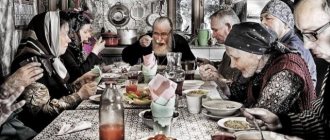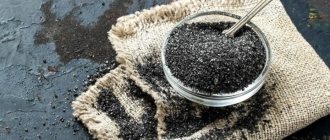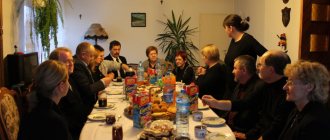Traditional Christian memorial days are a kind of milestones that the soul passes before finding itself in the eternal radiance of the heavenly palaces. Among these events, the fortieth day is a decisive day, a kind of trial, on which it is finally decided whether the soul will go to heaven after the graying of heaven and hell. At this third audience with the Lord, the soul of the deceased requires the support of relatives and friends, who, gathering at the table, pray to the dear deceased and remember the best things about him. It is important to remember that a wake is not a formal feast, but a family day of mourning, so the funeral meal for 40 days should be modest and simple at home.
Not only relatives, but also friends and acquaintances can remember the soul of the deceased at the table. The support of all loved ones is important and welcome on this day.
The importance of remembering for the soul on day 40
40 days later, Jesus Christ ascended to Heaven after the Resurrection, so this period of time is the most important for the soul. It is believed that the spirit of the deceased is going through an ordeal. And when the disembodied shell appears before the Lord, its further fate is determined. On this day, a wake is held, relatives pray for the deceased, thereby helping the soul - its sins can be forgiven. If loved ones beg forgiveness for the deceased, his disembodied shell will await the Last Judgment along with the righteous, and not in hell.
Lenten cabbage soup with mushrooms and beans (10 servings):
Take five medium potatoes, peel, cut and fry for fifteen minutes in a frying pan. Place the potatoes in boiling water and cook for another fifteen minutes. Combine in a food processor or grate one stalk of celery and one carrot, and then one onion. You should get a puree, which should be fried in a frying pan for ten minutes. Chop 400 grams of champignons and throw them into a saucepan along with vegetable puree. After boiling, leave the dish on the fire for ten minutes. Grind a third of a can of canned beans in a blender. Pour the remaining beans in the jar and the resulting pulp into the soup, add salt and pepper and cook for another ten minutes. Remove from heat, add herbs and let steep for a few more minutes.
The path of the soul from death to the fortieth day
After death, the ethereal shell goes through a difficult path; it is necessary to help it understand where it is, what is happening to it. We need to pray for the forgiveness of the sins of the deceased and the rest of his soul. There are 3 stages, each of which is important:
- third, the ordeal of the soul for the first three days: at this time the incorporeal shell is torn off from the body, a funeral is performed, and loved ones pray for the remission of sins of the deceased, according to Orthodox canons, a funeral dinner unites everyone who recognizes the mystery of the Resurrection of Christ;
- nine days from death - an answer to the Lord: from the third day to the ninth, the soul contemplates the beauty of the heavenly abode, appears before the Lord, in this it is helped by the prayers of relatives, in addition, commemorations for nine days are held in honor of the nine angelic ranks who intercede with Heavenly Father for the sinful soul;
- fortieth day, temptations and trials in hell for up to 40 days: the soul sees hell, can feel the suffering of those who are there, because it experiences torment for their sins, then appears before the Lord for the third time, the fortieth day is a special day of remembrance, when prayer loved ones are very important;
- calming the soul after remembrance: when the incorporeal shell goes through all the stages, it leaves the earth, if the prayers of loved ones helped overcome temptations, receive forgiveness for sins, the soul calms down in another world, becomes a protector for members of its family.
Visiting the grave of the deceased for 40 days
Rules for holding funerals for 40 days
Considering that the tradition of commemoration came from paganism and was supplemented by religious canons, many still adhere to incorrect beliefs: they drink alcohol at the grave on memorial days, put a glass of vodka covered with a slice of bread next to a photograph of the deceased, behave noisily during the funeral dinner , indulge in gluttony. These are external manifestations that can harm the soul and worsen its position in the afterlife. When the funeral table is set for 40 days, those who come begin the meal, it is important to take into account the rules of behavior:
- You should not put strong alcohol on the table, a small amount of Cahors is acceptable;
- there is no need to prepare a large number of dishes, an excess of delicious food at the funeral table in a cafe or at the home of the relatives of the deceased pushes guests towards gluttony, not everyone can overcome the temptation, as a result the meal turns into a feast;
- crumbs cannot be thrown away from the funeral table, they must be taken to the grave so that the deceased knows that the funeral has taken place;
- You cannot serve forks; according to a long-standing Russian tradition, only spoons are used during a funeral dinner; it is also customary to hand out mild cutlery to guests;
- a photograph of the deceased is placed, the lower corner is covered with black tape;
- for forty days at home, a glass of water is placed next to the photo, bread is placed on top, the set needs to be updated every day;
- on the 40th day, close the doors and windows of the house;
- on the last of the three important memorial days, one should grieve more calmly; loud crying will force the soul to remain and continue suffering among the living;
- During the meal there should also be cutlery for the deceased.
What is distributed for six months and 1 year after death
A funeral after 6 months is a new folk tradition that is not considered obligatory. Some gather relatives and close friends for the funeral table. Others simply offer food with a request to remember the deceased. The church orders a funeral service, donates money to the church for repairs and organizing holidays.
An anniversary is a more significant date. In the morning they go to church to order a memorial service and other memorial services. Kutya is consecrated for the funeral meal. Bags of food (not meat) are placed on a special table, which will then be distributed here or used to prepare lunch for those in need. It is allowed to supply Cahors wine and oil for lamps. You can also leave a monetary donation for the construction of the temple, or bring clothes. According to tradition, they commemorate with sweets and baked goods.
Funeral table for 40 days: traditional recipes both in cafes and at home
The number of dishes on the funeral table is always arbitrary, but there should not be too many of them. In addition, the food is prepared simply. When a menu is drawn up for 40 days, the funeral at home is held on the condition that the main dishes are prepared: kutia, jelly, pancakes. Some of the recipes are used more often. But such food is not traditional (vinaigrette salad).
Kutia is the main dish at funerals
Kutya is the main funeral dish.
The dish represents eternal life, into which the soul can enter through resurrection. Kutia is prepared before holidays (Christmas, weddings) or funerals. Products that need to be prepared are taken in arbitrary quantities:
- whole wheat or shelled grain;
- water;
- poppy;
- honey.
Traditional recipe:
- Wheat is soaked for 10-12 hours. Moreover, the water should cover the grain.
- Boil for 1-2 hours. Cleaned grains will cook faster – in 1 hour.
- The poppy seed also needs to be cooked, it is boiled (20 minutes) and crushed.
- The components are mixed.
- Add honey to taste.
Berry jelly
Kissel for a funeral dinner
Products prepared:
- fresh fruits or berries – 2 kg;
- sugar – 1 kg;
- water – 15 l;
- starch – 100 g.
The recipe is simple:
- Boil fruits/berries.
- Add sugar.
- Mix starch with a small amount of water.
- Dissolved starch is added to the finished compote. It only takes a few minutes to cook after this.
Salad Vinaigrette
Vinaigrette for forties
What you will need:
- potatoes – 5 pcs.;
- beets – 2 pcs.;
- carrots – 2 pcs.;
- pickled cucumbers – 6 pcs.;
- green peas - 1 can;
- onion – 1 pc.;
- vegetable oil - to taste;
- salt - to taste.
Recipe:
- Vegetables are boiled separately: beets, potatoes, carrots.
- Peel and cut into cubes.
- Add peas.
- Cucumbers are cut and added to the salad.
- Peel and cut the onion (you can use half rings or cubes).
- Salt, add vegetable oil.
Pancakes without filling
Pancakes for guests at a funeral service.
They are usually served without additives. It is customary to put simply fried pancakes on the table. You can use any dough recipe. Traditional set of products:
- milk or kefir;
- flour;
- water;
- eggs;
- sugar;
- salt;
- vegetable and butter.
The amount of ingredients may vary, depending on the volume of dough being prepared.
Funeral lunch menu
Organizing a wake has its own meaning and certain significance.
The main dish is kutia made from rice with raisins and pancakes. Next they serve borscht, or cabbage soup. The first must be hot so that steam rises from it, helping the soul of the deceased to rise to God. The next dish in line is porridge, which implies strength. Guests are treated to eggs, which are a symbol of the immortality of the soul.
Additional treats are:
- All kinds of salads;
- Sauerkraut;
- Pickles;
- Sliced sausages, cheese and vegetables;
- Salted and smoked fish;
- All kinds of meat preparations;
- Fried fish.
If they are commemorating at home, then you can put jellied meat. Pies filled with mushrooms, dried apricots, apples or kulebyak are a must-have treat. For dessert: buns, cookies and candies. Drinks include jelly, dried fruit compote, and various juices.
Question-answer section
What to give to people at a wake?
Expert opinion
Father Pavel
Clergyman
Most often in various countries, those who come to say goodbye to the deceased are given ordinary handkerchiefs (handkerchiefs). This tradition has its own meaning - the thing symbolizes the memory of the deceased. At the end of 40 days from the date of death, you can decide what to do with the scarf; most often they are burned, because they believe that this way they can destroy negative energy. However, it is also used for its intended purpose. In some regions, it is customary to give spoons to those who have come to say goodbye to the deceased before leaving.
What can you bring to the table for a wake?
Expert opinion
Father Pavel
Clergyman
When guests are invited to a 40-day memorial dinner, the menu may be put together at the last minute. At the same time, people themselves bring different dishes: lean pancakes, cutlets, salads. But soups are still more often prepared at home by members of the deceased’s family. On the 40th day after the death of a loved one, it is important to pray, so outside help will not hurt, this will allow relatives to devote more time to thoughts about the departed relative.
What should you not do at a funeral? What will it be like?
Expert opinion
Father Pavel
Clergyman
Drinking alcohol, loud laughter and outright fun are not encouraged, as well as ignoring the needs of the deceased - it is recommended to put an empty plate and other utensils for him. Violating the rules for celebrating Memorial Day does not have obvious consequences, but the harm to the soul is obvious - relatives will not be able to provide support to the soul of the deceased, which will lead to the continuation of his suffering.
Why are there only spoons on the table?
Expert opinion
Father Pavel
Clergyman
In ancient times, when forks had not yet been invented, it was believed that sharp objects attracted Satan and could destroy the soul of a Christian. But the situation did not change even after many saw why such a device was used. It should be remembered that this is a pagan vision, the Church does not give an exact answer, because the Holy Scriptures do not touch on this topic. This may mean a neutral position for the clergy, the ability to continue to use the fork. But during the funeral meal, it is better to do as the residents of the house recommend (take a spoon).
How to set a funeral table during Lent?
Expert opinion
Father Pavel
Clergyman
When the table is set for 40 days, the choice of dishes is made taking into account religious holidays. If fasting begins while preparing the meal, you must adhere to it. Moreover, they choose only lean dishes without dairy products or meat. Even pancakes for 40 days should be prepared with the addition of water if a firm decision is made to adhere to fasting.
What to do with funerals that fall on Easter?
Expert opinion
Father Pavel
Clergyman
It is recommended to wait until after Bright Week. It is best to hold a funeral on Radonitsa. But if a relative dies during fasting, then a funeral is held according to traditional rules. When the death of a loved one occurs on a Great Religious Holiday, it is better to wait for it to end, but in the meantime you should submit a note to the temple about the repose of the soul.
What to prepare for 40 days after death for a wake at home among Orthodox Christians?
Expert opinion
Kulagina Evgenia Alekseevna
Chef 6th category, co-owner of the Poesh-ka canteen chain
It is generally accepted that on the fortieth day the soul appears at home with relatives for the last time. To set the funeral table, prepare the following dishes:
- Kutya;
- uzvar or jelly;
- salads;
- first: noodle soup, borscht, beetroot soup, etc.;
- cutlets;
- fish dishes;
- pancakes;
- side dish: rice, buckwheat, mashed potatoes;
- cabbage rolls
What salads can be prepared for a 40-day funeral?
Expert opinion
Kulagina Evgenia Alekseevna
Chef 6th category, co-owner of the Poesh-ka canteen chain
Most often, fermented ingredients are used. The main variety among existing salads is vegetable (cabbage, beets), for example, vinaigrette. But recently it has become common to cook them with mayonnaise. The composition includes crab sticks, sausage or crackers, etc. A prepared salad for a funeral for 40 days fits into the menu, but on the condition that fasting is not approaching.
Is it possible to shift the dates of the funeral?
Expert opinion
Father Pavel
Clergyman
The clergy allow changes in the timing of funeral services. A common reason is a major church holiday. Prayers are read for the repose of the soul in the church, and a wake is held when the celebration is over according to the calendar.
Is there no place for alcohol at a funeral table?
Expert opinion
Father Pavel
Clergyman
The church prohibits the consumption of alcoholic beverages during the funeral meal. The reason is that the mind becomes clouded, the body relaxes, the desire to satisfy carnal needs arises, and the soul of the deceased is no longer cared for. In addition, the deceased also has a harder time; he does not get rid of his sins.
Rules for visiting cemeteries and churches for up to 40 days
Nowhere is it stated on what days you can go to the grave of the deceased: Tuesday, Wednesday, Friday, etc. But there are other rules:
- visit before sunset: it is believed that you should visit the grave during the daytime, and even better - at lunchtime, because at other times you can feel the impact of negative energy;
- refreshments and flowers for remembrance: food should be taken to the temple, for which a memorial table is provided there, they are not left at the grave, but flowers are welcome, a lamp is the attributes of remembrance;
- flowers to the grave are part of the tradition of visiting the deceased; you can bring artificial or fresh flowers; in the spring it is recommended to plant plants;
- putting the grave and cross in order on the 40th day: it is recommended to go to church, pray for the soul of the deceased, cleaning the grave can also be done, when the 40th day comes, you need to remove the wreath, clean and straighten the cross;
- the importance of prayers for the deceased for up to 40 days: at this time the future fate of the soul is decided, where it will go, to heaven or hell - the Lord decides, but the prayer words of loved ones help to overcome this path, as well as receive forgiveness for long-standing sins;
- Sorokoust for 40 days and a memorial service: it is recommended to order Sorokoust - this is a prayer that is read for 40 days for the soul of the deceased; in addition, a memorial service is held - another memorial rite (divine service), performed on the 3, 9 and 40 days after the death of a person.
Lenten watering in Belarusian style
In many regions of Belarus, wakes traditionally end with an ancient dish - watering. Here is an example recipe for Lenten gravy with dried mushrooms.
You should take:
- 2 liters of water;
- one medium-sized onion;
- 2 tablespoons of vegetable oil;
- 4 tablespoons of wheat flour;
- 0.5 teaspoon sugar;
- 1 tablespoon salt;
- 2 tablespoons of tomato paste;
- one bay leaf;
- 4-5 peas of allspice;
- about 50 g of dried mushrooms (white ones are best).
Preparation:
Soak the mushrooms in warm water for 4 hours, then rinse and cut into strips. There should be at least a glass of them. Peel and finely chop the onion, fry in a heated frying pan with sunflower oil, gradually adding prepared mushrooms, allspice, sugar, half a tablespoon of salt and tomato puree. Boil 2 liters of water in a saucepan, add bay leaf and half a tablespoon of salt. Transfer the contents of the frying pan into the pan. Stir and bring to a boil over low heat. Dilute the flour with cold boiled water, strain through a sieve so that there are no lumps. Gradually, stirring well, pour the diluted flour into the water with the mushrooms. After boiling, turn off and let sit for half an hour. Serve the finished sauce sprinkled with chopped herbs.
City Ritual Service LLC will help you book a place for Orthodox funerals during Lent and coordinate the appropriate menu. This is especially convenient when there are a significant number of guests. You can place an order by calling +375 (44) 782 97 76. Our communication line is available at any time of the day.
How do other nationalities say farewell to the soul of the deceased? Traditional dishes at funerals
Representatives of different nations have their own customs in which they sacredly believe:
- North Caucasian peoples of the Russian Federation (Circassians): here they bury a person the next day, and they use a shroud, and the Koran is read over the body; after the funeral, for those who came from afar, it is customary to prepare a treat - lamb, flatbreads fried in oil;
- The burial ritual of the Armenians is similar to how it is carried out by the Russians: the funeral is on the 3rd day, and the wake is held the next day after the burial, and it is necessary to prepare a traditional dish - khashlama (vegetables with meat);
- funerals in Azerbaijan are held in a magnificent manner, it is customary to prepare many dishes, the main one being semeni (analogous to kutya), sprouted wheat grains are used for this.
Buckwheat with prunes (10 servings):
You will need 600 ml of buckwheat (3 cups), carrots and onions (3 pieces each), 300 grams of prunes, salt, vegetable oil. The prunes need to be washed and poured with boiling water for 15 minutes. At this time, it is necessary to rinse the buckwheat under running water. Grate the carrots and chop the onion. Place the mixture of onions and carrots in a frying pan and fry. When the vegetable frying is ready, add prunes, cut into pieces. Pour buckwheat into the pan, add salt, pour 6 glasses of water, cover with a lid. Leave to simmer for 15-20 minutes.











